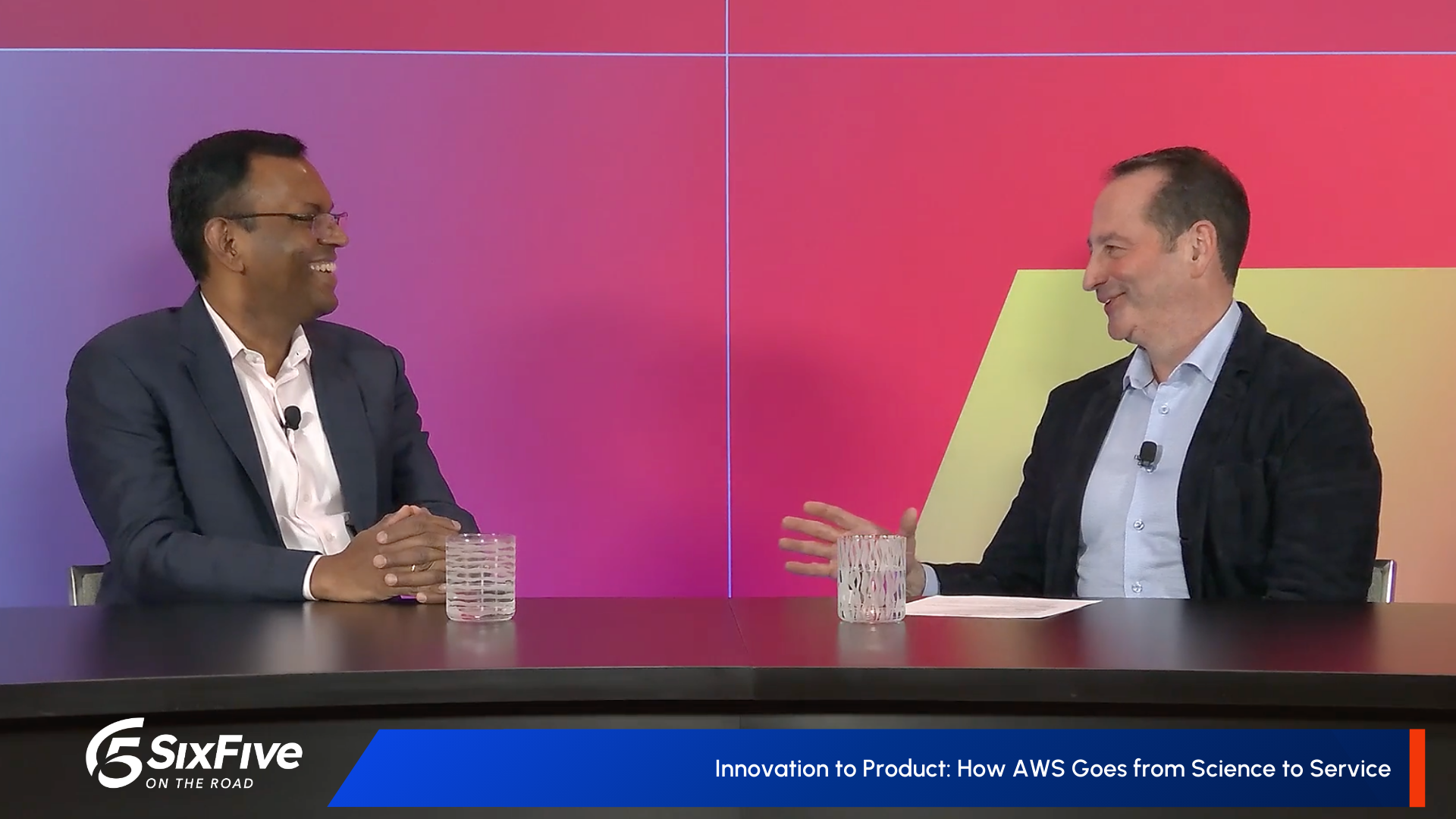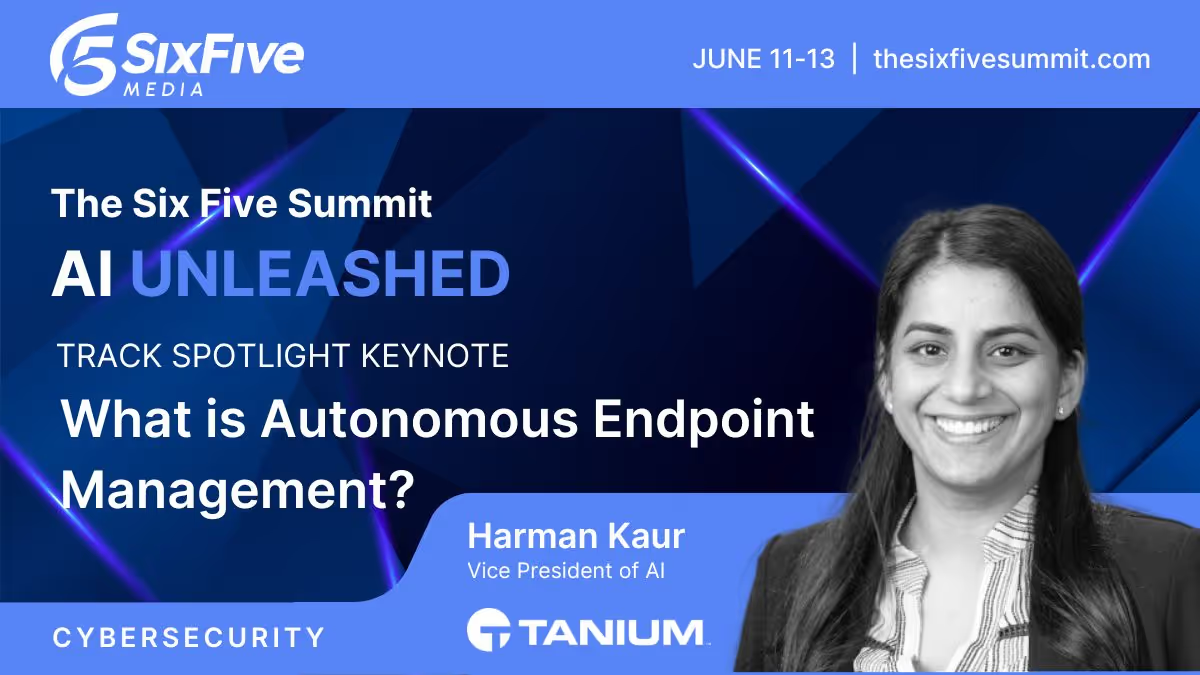Driving Real AI Impact in the Enterprise - Six Five On The Road
Todd Cione, President of Worldwide Sales at OpenText, joins hosts to share insights on how enterprise AI buyers are prioritizing measurable outcomes, rapid deployment, and trusted governance in a changing partner ecosystem.
How are enterprise buyers redefining success—and proving real ROI—as AI adoption accelerates across industries?
At OpenText World 2025, Patrick Moorhead and Daniel Newman sit down with Todd Cione, President of Worldwide Sales at OpenText, to unpack how enterprises are reshaping AI investment strategies, tightening expectations for deployment, elevating partner ecosystems, and demanding trusted, governed platforms that deliver measurable impact.
Key Takeaways Include:
🔹Shift toward measurable outcomes: Enterprises are increasingly under pressure to demonstrate tangible, data-driven results from their AI investments.
🔹Demand for faster, outcome-based deployment: How sales and service organizations are adapting to accelerate time-to-value, moving away from lengthy transformation projects.
🔹Evolving partner ecosystem: The role of channel and technology partners is transforming as organizations seek specialized capabilities and governance in AI deployments.
🔹Industry-specific demand: Trusted, governed AI platforms are drawing the highest interest in verticals where compliance and data stewardship are non-negotiable.
Learn more at OpenText.
Watch the full video at sixfivemedia.com, and be sure to subscribe to our YouTube channel, so you never miss an episode.
Or listen to the audio here:
Disclaimer: Six Five On The Road is for information and entertainment purposes only. Over the course of this webcast, we may talk about companies that are publicly traded, and we may even reference that fact and their equity share price, but please do not take anything that we say as a recommendation about what you should do with your investment dollars. We are not investment advisors, and we ask that you do not treat us as such.
Patrick Moorhead:
The Six Five is On The Road here at Open Text World 2025 here in Nashville, having a great time. Daniel, it's been a good show so far. It's really great to see the focus on data. You know, it's funny, you and I were out in Seattle about two and a half years ago. When a guy named Sam Altman was on stage with Satya. Everybody knew Satya, nobody knew Sam. And I think you and I both were thinking, gosh, this AI is great, vacation planning and everything, but how are enterprises going to light it up?
Daniel Newman: Yeah, in some ways, it feels like it's gone so fast. In other ways, it feels like it's taking its time. And not only two and a half years ago, were we listening to Sam and the rollout of open AI and chat GPT. You know, it's a big public debut, we call it. But for what? For multiple decades now, we've been covering big data, analytics, and machine learning. What is AI of five decades now, since early algorithms? And, you know, I think right now where we're at is this interesting inflection to where we're trying to bring some of this, you know, high-velocity consumer AI speak and turn it into something in the enterprise, which is arguably a much bigger opportunity.
Patrick Moorhead: It is. And results are everything when it comes to businesses. And Daniel, I think our favorite thing is when theory becomes reality in talking to real end users. But hey, we have somebody on our show here, Todd, who is pretty much his whole day, he talks with customers along with his team. Todd, how are you? Welcome to The Six Five.
Todd Cione: Hey, thank you for having me. I'm doing great. This is a high energy week for us at OkenTex. We're hosting, you know, a couple thousand customers here in Nashville. We've got several hundred partners here. So it's an outstanding week.
Daniel Newman: Yeah, it's always great when you, you know, because you need worldwide sales for the company to finally have a chance to get off the plane and not have to get back on right away to see more than a few customers, right?
Todd Cione: You're correct. You get here, you know, you got to call it a target rich environment. And hopefully you're having a lot of great meetings. You know, one of the things I think, and you're kind of on both sides of it running sales, because you're probably looking at putting it out of work. for your team, sales enablement, automations, workflows, all the things that you're trying to do. And of course, probably use a lot of open text for those things. You're also having conversations, you know, when you go to dinner five or six times each night here, when you're at an event like this, you're going to be listening and saying, hey, what are the things that need to be measured to justify the investment, right? All the questions around AI right now, Todd, are, can I get ROI? Like, we get the POC. We get that this stuff's pretty neat. It's fun to chat or create a cool video with your cat. But like, I want to build a workflow that basically helps my salespeople be 50% more productive. Like, how are you sort of helping customers and maybe even your own customer zero use case, figuring out what is tangible and valuable and getting them to the point where they're saying, this is good money, good money well spent.
Todd Cione: Yeah, that's a good question. It's a very fair question. We're very focused on outcomes. Look, I've had the opportunity, maybe just based on my career stage, to have worked through some very significant technology and collection points in the industry, you know, from, quite frankly, from desktop computing to enterprise computing, client server, to the cloud with mobility as well. And now artificial intelligence is accelerating probably at a faster pace than any of those. And a couple of the patterns that are the same are consumer technology, like in mobility. What we did with an iPhone quickly out of the gates when the iPhone was released, it took some time for that to make an impact in the enterprise, right? Security and enterprise processes are really different. And we're seeing similar things, but at a faster pace in the enterprise, right? So chat GPT leveraging large language models for all of us as consumers. Enterprises expect the ability to drive innovation with the same type of tools, but heavy, heavy security. Really, really, really heavy, heavy security. So it's a little bit different. We think that 90% of the world's data sits behind enterprise firewalls.
Patrick Moorhead: Yeah, like the iceberg.
Todd Cione: And that is the truth. Yeah. That's exactly right. And so the key, though, with that is how do large enterprises actually get insight out of that data to train their agents? And that's what we're really focused on.
Patrick Moorhead: No, that's good. And yeah, I took a couple pictures and got it on social media. And that was definitely one of them. The whole data conversation still to this day. I mean, I did a CIO roundtable two weeks ago in London, and that was the second obstacle that they talked about. It just keeps going on. So that was good to see. You also talked about, during your keynote, the ways that, and these are my words, not yours, how you can shrink the time from time to AI or time to outcomes. How are you helping customers to accelerate this very challenging journey that they have to go through?
Todd Cione: Yeah, I think it starts with understanding your customer's business. In the early days of AI, even just a couple years ago, we saw centers of expertise stood up in large enterprises where they are trying to figure it out. This is now pretty distributed into functions and into business units, so we work really closely with P&L owners or central IT to understand the business problems they're trying to solve. And then we help them stand up rapid proof of concepts and get those into production. And that's the key. Today, on stage, I spoke with a senior executive from Cardinal Health, a massive health care company in the United States, in fact, one of the largest 15 companies in the US. And they are deploying, or the precipice of deploying AI to help them get much more insight quickly out of all of their data created by humans. So our content management platform is a way that we can help them do that very, very quickly.
Patrick Moorhead: That's interesting. You're going full turnkey in a way. You're doing the consulting up front and then the technological portion, but it sounds like you're meeting with the business owners, so you're probably focused on workflows. At least that seems to be the action du jour right now for particularly agentic workflows.
Todd Cione:Very much focused on workflows. In fact, you could think that we are the industry leader in helping enterprises get valued up unstructured data, structured data, we work super closely with, you know, systems of record providers, the biggest of which SAP has been a partner of ours for 25 years. And so as they move their customers to the cloud and modernize digitized enterprise environments, we are a core part of that entire bill of materials.
Daniel Newman: So right now, you know, we're seeing a lot of updates and improvements and features being rolled out in these different workflows, right? And what can an agent do? We know for sure that agents are going to be part of the teams in the future, right? But as you're like talking to the customers, What are the sort of step functions that, you know, whether it's features, improvements, modifications to kind of what's been offered up to this point that you're rolling out, that you're hearing is like, yes, this is what kind of, this is the change that we need to see to sort of see this go from maybe POC to widely deployed or see us go from getting small efficiency gains to a combination of efficiency productivity? Hearing some of those different things, could you share a little bit about that?
Todd Cione: Absolutely. One of the biggest patterns that I see is getting the right data and clean data to train agents. That is one of the biggest variables to having a great outcome with agents. Poorly trained agents without enough data or the wrong data, you're not going to get outcomes. You're not. And there's significant improvement, exponential improvement, with agent outcomes when you provide a high quantity and quality of data that typically, again, is coming from within the enterprise, from unstructured data, whether that's human-created content, emails, documents. It could be machine-created content, could be managed assets. architecture, and it could be transaction created content. Just think about all the supply chain content that is spun off. That's what we help enterprises do to train agents so that they are more effective quickly for them.
Patrick Moorhead: No, that makes sense. A lot of other feedback related to that is, I've seen people, they have to change their workflow to get these agents to work. And yes, you can get the right data, but a lot of people might take a 20-step process. And they first have to look at it and say, you know what, I only need five. Only five make sense in this environment. Some of the people that went from paper to even ERP systems, some of them didn't fully change the process. They essentially copied paper to the web.
Daniel Newman: Digital transformation 1.0. That's where we take our physical process and we put it on the screen. Yeah, it's interesting you lift and shift. It's interesting you point that out. It's also one of those things when it comes to data, I think there was some mention of this in the keynote, Todd, but it was something along the lines of how good it should be before it's good enough. In sales, there might be a small margin of error. But I know in the earliest rollouts of agentic, there was a lot of CEO fighting on social media about, well, what if it spills the data? What happens if you're using this generative app to write a letter and it accidentally includes a social security number, a credit card piece of data? I've got to imagine hearing a lot of those conversations. How good does it have to be before we take this as a production?
Todd Cione: Secure information management is the only way to have AI work in the enterprise. You cannot innovate at the expense of security. You cannot. You talk to any CIO or chief information security officer, they're gonna tell you the same thing. Any board of directors, cybersecurity is the top, top issue for any board. So you cannot go fast that undermines cybersecurity and it has to be top of mind.
Patrick Moorhead: Want to shift to partners and ecosystems here. I mean, it always takes a village, particularly in these large inflection points, social, local, mobile. I live through client server, web, e-commerce, all of those. What do partners look like and what is that relation? Does it change at all in this world of agentic workflows?
Todd Cione: You know, it's evolving rapidly. I think gone are the days where an enterprise technology company can go at it on their own. It is an ecosystem and you're seeing that unfolding, you know, every day with new partnerships and alliances being announced, you know, across the industry.
Daniel Newman: There's like five today.
Todd Cione: Exactly. We announced several today on stage ourselves and there were some others. Yeah. Right. And, and I saw, uh, announced as well. So the ecosystem to Open Text is extremely important. You could think of it in a variety of different categories. Look, we've got a large professional services organization that exists to add value to enterprises, and we work and will work increasingly closely with large global system innovators. It's not an or, it's an and. The cloud service providers play such an important role today, and they will continue to play an important role in the future. I think you're going to see telcos come back to becoming a critical, important part of an ecosystem because of the sovereignty that they represent within countries. They're aligned to nation states in many ways, and they can provide sovereign offerings in country. And so those partnerships for us are very, very important as well.
Patrick Moorhead: Yeah, we're expecting Dan and I will both be at Global World Congress, so expecting to see the show at Sovereign Capabilities this Q2. It is.
Daniel Newman: They also have the infrastructure footprints. They do. And they've always been pretty well regulated, which provides the opportunity to make sure for what sovereignty, the purpose it's supposed to and intended to serve is that that data doesn't go where it's not supposed to go. Heavy investments going into telcos right now. You look at a lot of those announcements, Google, NVIDIA, big investments with telecommunications.
Patrick Moorhead:I was at GTC Washington DC when they rolled out an equipment provider that will make its way into different carriers.
Daniel Newman: Also providing a lot of edges. a lot of edges to expand these data centers that are built out at such incredible scale right now. So you sort of alluded to one. I'd like to wrap up here with you. You alluded to telco and the sovereign clouds, but are there any other industries that you're seeing really strong demand signals from, in particular, kind of industries that are maybe getting out there faster, building these sort of frontier AI, frontier organizations, and really going all in?
Todd Cione: Regulated industries obviously are tricky because of the regulation that are required for them to operate effectively, but that's what we do really well. So financial services, there's a tremendous amount of investment going on in all sections of large banks, whether it's consumer, etc. Telcos, regulated industries, healthcare, life sciences, massive investments going on today. We talked a little bit about Cardinal Health. Tomorrow on stage, you're going to hear from Ochsner, Healthcare, they're one of the larger integrated healthcare delivery networks in the Gulf states, growing rapidly. They're making big investments as well. Public sector, we're seeing a lot of movement there as well. So, regulated industries, some heavy investment we're on now.
Daniel Newman: Yeah, I think overall right now every industry's got varying thresholds, but we genuinely believe, and I say we, I'm speaking for both of us. I think any enterprise that doesn't kind of lean is going to very quickly be left behind. I think we're kind of in that big inflection point, as I said, when we started the show, where there was this time or AI where you could kind of watch and drift. Right, and kind of see what's happening from the B2B and enterprise standpoint. That period is quickly going to be behind us. So much great progress is being made by OpenText and so many other companies in that, as you said, ecosystem and that collaborative environment.
Todd Cione: We're very excited about it. And I'd say maybe just the last pivot, just as companies have to invest, also functionally, if you think about it. I believe that certainly the future of B2B sales will be different related to AI. But in the near term, the biggest difference will be human B2B sellers that use AI effectively and those that don't. And that's where the gap that I see growing right now is we have, you know, in the industry, there are people that are embracing it to help them become more effective, a better version of themselves. And, you know, to a lesser extent, those that aren't, no gap will widen.
Daniel Newman: Almost a universalism right now, whether it's a programmer or a developer, best ones generally say I'm using AI like crazy and I'm as productive as I've ever been. And then there's the people that are sort of fighting it. And I don't think that ends particularly well. Todd, it was a lot of fun to have this conversation.
Todd Cione Likewise. Thanks for having me.
Patrick Moorhead: Thanks, Todd. I appreciate it.
Daniel Newman: Congratulations on all the progress. And we'll talk to you again soon. We'll get an update from the sim. And thank you, everybody, for being part of this episode of The Six Five on the Road. We're at Open Text World 2025 in Nashville, Tennessee. Subscribe. Stick with us for all of our coverage here at the events and, of course, all of the great coverage here on The Six Five. But we've got to say goodbye for now. We'll see you all later.
MORE VIDEOS

The View from Davos with Wedbush’s Daniel Ives
Daniel Ives of Wedbush Securities joins Daniel Newman from Davos to discuss why AI adoption is entering a monetization phase, how enterprise software and modernization are driving ROI, and why the current cycle looks more like the early stages of a long-term buildout than a speculative bubble.

The View from Davos with Check Point CEO Nadav Zafrir
From Davos, Check Point CEO Nadav Zafrir joins Daniel Newman to discuss why cybersecurity has become a foundational requirement for AI transformation, and how prevention-first strategies and AI-powered defense are essential as agents move into real-world systems.
Other Categories
CYBERSECURITY
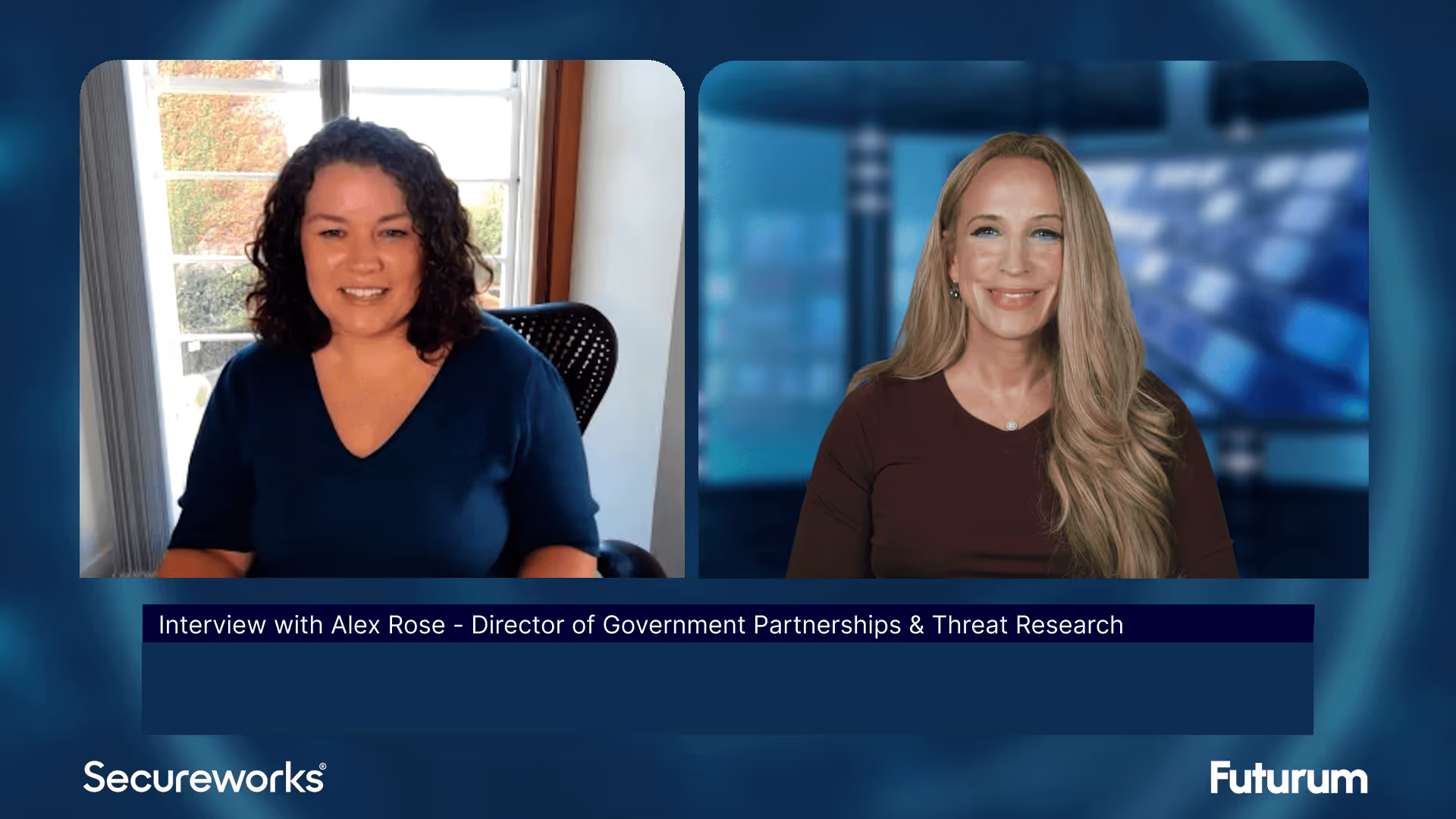
Threat Intelligence: Insights on Cybersecurity from Secureworks
Alex Rose from Secureworks joins Shira Rubinoff on the Cybersphere to share his insights on the critical role of threat intelligence in modern cybersecurity efforts, underscoring the importance of proactive, intelligence-driven defense mechanisms.
QUANTUM
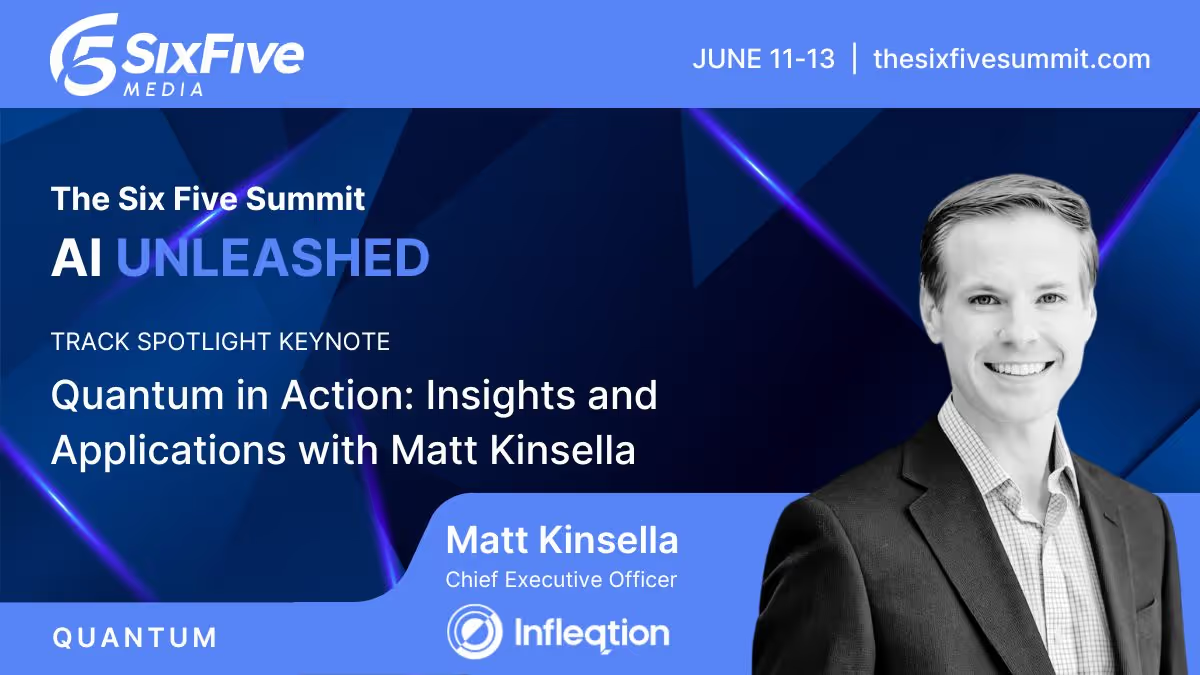
Quantum in Action: Insights and Applications with Matt Kinsella
Quantum is no longer a technology of the future; the quantum opportunity is here now. During this keynote conversation, Infleqtion CEO, Matt Kinsella will explore the latest quantum developments and how organizations can best leverage quantum to their advantage.
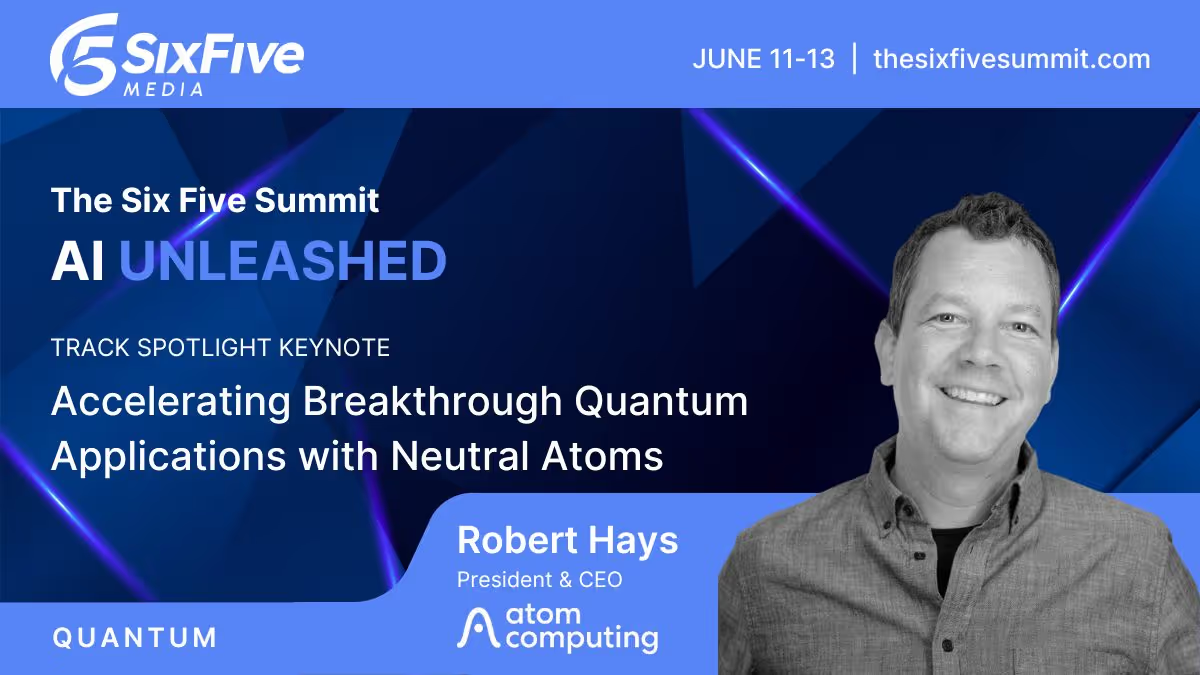
Accelerating Breakthrough Quantum Applications with Neutral Atoms
Our planet needs major breakthroughs for a more sustainable future and quantum computing promises to provide a path to new solutions in a variety of industry segments. This talk will explore what it takes for quantum computers to be able to solve these significant computational challenges, and will show that the timeline to addressing valuable applications may be sooner than previously thought.



